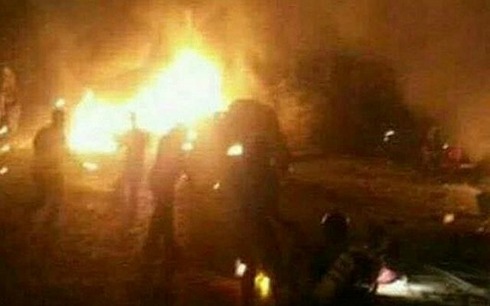Archives
AND MORE...

A Ceasefire...Maybe
_____________________

Our 'Deal Partners'
_____________________

Here Come The Marines
_____________________

Breathtakingly Stupid
_____________________
September 8, 2017
A Punctuated Message
The timing of the airstrike allegedly carried out by the Israel Air Force against a Syrian advanced weapons development facility early Thursday morning could not have been more apt (see below).
It also sent a message to “Syria, Iran and Hezbollah, as well as the United States and Russia that Israel would continue to act” in Syria if necessary, ceasefire between the regime and rebels be damned.
As well as the "United States"?
Apparently, Arabic daily Asharq Al-Awsat reported last week that the US agreed to let Iran-backed militias take positions within 10 kilometers of Israel’s border with the Syrian Golan Heights, a troubling notion for the Jewish state as it would open up yet another potential front for terrorist groups in a future conflict.
Sad that Israel’s closest ally, the US, needs to be reminded that Iran-backed militias near Israel’s borders are a bad idea. In fact, we’re not quite sure why it’s even in America’s interests to allow it.
You can read the details below. [Worth noting, however, that these alleged Israeli planes were somehow able to evade a newly-installed and very advanced Russian air defense system the Russians recently set up in Syria. Needless to say, the Syrians, Iranians and Hezbollah - not to mention the Russians - were quite peeved by this alleged Israeli attack.]
“While declaring a policy publicly might send a message to Israel’s allies and enemies about its intentions, nothing can state that position more clearly than a missile,” writes Mr. Gross below.
And with that we wholeheartedly agree.
Times of Israel | September 7, 2017
With Alleged Airstrike, Israel Punctuates Opposition To Syria Ceasefire Pact
Bombing of Syrian precision missile, chemical weapons facility sends clear message to world: We'll take action when necessary, no matter what
By Judah Ari Gross

A poster bearing an image of Syrian President Bashar al-Assad (R) and Hassan Nasrallah head of Lebanese Shiite movement Hezbollah is seen in Damascus on September 7, 2017. (AFP/LOUAI BESHARA)
The timing of the airstrike allegedly carried out by the Israel Air Force against a Syrian advanced weapons development facility early Thursday morning could not have been more apt.
The aerial attack came nearly 10 years to the day after Israel allegedly destroyed a Syrian nuclear reactor; a few weeks after Hezbollah leader Hassan Nasrallah visited Damascus; two weeks after a meeting between Russian and Israeli heads of state; a day after a United Nations report formally blamed the Bashar Assad regime for a sarin gas attack earlier this year; and in the midst of the IDF’s largest exercise in nearly two decades, in which tens of thousands of soldiers are simulating a war with Hezbollah, a key part of the Syrian-Iranian Shiite axis.
In addition to whatever tactical value was gained from destroying such a facility, the early Thursday morning bombing run also presented a message to Syria, Iran and Hezbollah, as well as to the United States and Russia, that Israel would continue to act in the war-torn country if necessary — ceasefire between the regime and rebels be damned.
The target was a Scientific Studies and Research Center (CERS) facility, which reportedly produces and stores both chemical weapons and precision missiles, located outside the city of Masyaf, in Syria’s northwestern Hama region, nearly 300 kilometers away from Israel’s northernmost air base.
 “It targeted a Syrian military-scientific center for the development and manufacture of, among other things, precision missiles which will have a significant role in the next round of conflict,” wrote Maj. Gen. (res.) Amos Yadlin, a former head of Israel’s Military Intelligence, on Twitter.
“It targeted a Syrian military-scientific center for the development and manufacture of, among other things, precision missiles which will have a significant role in the next round of conflict,” wrote Maj. Gen. (res.) Amos Yadlin, a former head of Israel’s Military Intelligence, on Twitter.
Maj. Gen. (res.) Yaakov Amidror, a former national security adviser, also noted that the rockets fired by Hezbollah at a Haifa train station during the 2006 Second Lebanon War, which killed eight people, were manufactured at the Masyaf facility.
Prime Minister Benjamin Netanyahu said he told Russian President Vladimir Putin explicitly that Israel would act in Syria, during their meeting last month in the Russian city of Sochi.
 “We will act when necessary according to our red lines,” Netanyahu told reporters after the meeting. “In the past, we have done this without asking permission, but we have provided an update on what our policy is.”
“We will act when necessary according to our red lines,” Netanyahu told reporters after the meeting. “In the past, we have done this without asking permission, but we have provided an update on what our policy is.”
But while declaring a policy publicly might send a message to Israel’s allies and enemies about its intentions, nothing can state that position more clearly than a missile.
Yadlin noted that Russia and the US, which are helping negotiate and maintain a ceasefire in Syria, have been “ignoring the red lines that Israel has established.”
For instance, last week, the Arabic daily Asharq Al-Awsat reported that the US agreed to let Iran-backed militias take positions within 10 kilometers of Israel’s border with the Syrian Golan Heights, a troubling notion for the Jewish state as it would open up yet another potential front for terrorist groups in a future conflict.
According to Yadlin, the overnight airstrike also served to show that the presence of Russian troops — and their advanced air defense systems — “do not prevent actions, which are attributed to Israel, in Syria.”
Israeli airstrikes in Syria, while not quotidian, have been a fairly common occurrence over the course of the country’s civil war, which began in 2011. The Jewish state has long-held a public policy of maintaining “red lines” and taking action if they are violated.

A Syrian facility reportedly attacked by Israeli aircraft early on Thursday, September 7, 2017. (screen capture: Twitter)
Yet Thursday’s strike also represented a change in tack for Israel, Amidror said during a phone briefing with reporters organized by the Israel Project.
Yadlin wrote that the attack was “not routine.” Indeed, it was the first airstrike apparently conducted by the IAF since the Russian-American brokered ceasefire went into effect earlier this summer.
Israel has cast doubts over the agreement, which it says allows Iran to entrench itself near the Golan border in southern Syria.
 According to Amidror, the strike on the CERS base was the first time Israel targeted not a Hezbollah weapons convoy nor a Hezbollah warehouse on a Syrian base, but an Assad regime production facility.
According to Amidror, the strike on the CERS base was the first time Israel targeted not a Hezbollah weapons convoy nor a Hezbollah warehouse on a Syrian base, but an Assad regime production facility.
The former national security adviser connected the airstrike to Nasrallah’s visit to Damascus last week. He said that during the terrorist leader’s visit to Syria, he likely secured a deal in which Assad would either “transfer the facility to Hezbollah or at least supply weapons to Hezbollah.”
Amidror noted he did not have access to intelligence to confirm that estimation, but said the “only logical explanation for this attack” was that weapons from the Masyaf base were going to be given to the terrorist group, in violation of one of Israel’s “red lines.”
He added that the target of the strike was likely the missile production facilities on the base, not necessarily the chemical weapons. While Hezbollah is believed to have a stockpile of over 100,000 missiles, Amidror said he was unaware of the terrorist group having significant quantities of chemical weapons in its possession.
Some aspects of the timing of the strike are more than likely coincidence. The 10-year anniversary of Operation Orchard, as the strike on the Syrian nuclear core is known, and the publication of the UN report accusing Assad of a war crime were likely non-factors in conducting the bombing.
According to Amidror, the massive IDF exercise might have served as a certain degree of back-up for the strike, but was probably not a consideration either.
But intentional or not, these factors drive home the point that while Thursday night’s airstrike attributed to Israel might have adhered to the established “red lines” policy, but it was not just more of the same.
Original article here.
Log In »
Notable Quotables
"Mr. Netanyahu is one of the most media-savvy politicians on the planet. On Friday he appeared live via video link on 'Real Time with Bill Maher,' taking the host’s alternately sardonic and serious line of questioning with gazelle-like alacrity."
~ Anthony Grant, jourrnalist who has written for many major newspapers and worked in television at Paris and Tel Aviv, interviewing former PM Benjamin Netanyahu on Monday, at the outset of Mr. Netanyahu's new book (more here).


